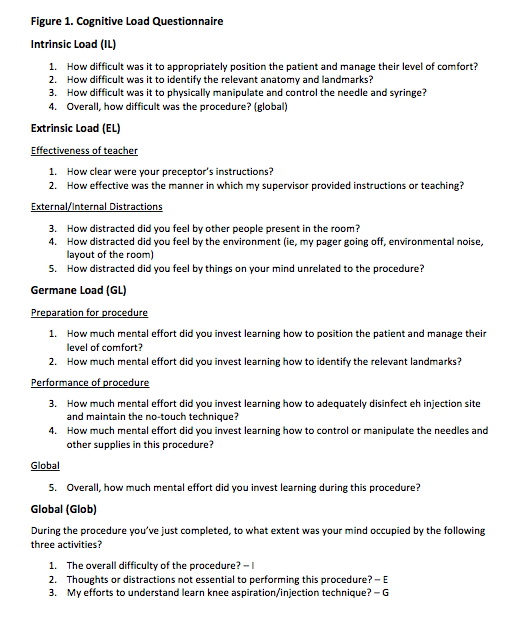Session Information
Session Type: ACR Concurrent Abstract Session
Session Time: 2:30PM-4:00PM
Background/Purpose:
Cognitive load theory is increasingly recognized as a meaningful construct in medical education and considers learning to be limited by availability of working memory. Demands on working memory are defined as cognitive load (CL), which is characterized as intrinsic (IL—related to the inherent difficulty of the task), extrinsic (EL—factors unrelated to the task), and germane (GL—deliberate cognitive processes used to acquire skills). Optimal learning conditions limit IL and EL, and increase GL. The Cognitive Load Inventory for Colonoscopy (CLIC) was developed as a tool to measure CL during procedural training in colonoscopy. The purpose of this study was to examine the initial experience with an adaptation of the CLIC to measure CL during arthrocentesis training.
Methods:
From 2016 to 2018, 149 learners participated in a previously validated knee injection objective structured clinical examination (OSCE) during the MSK Education Week at the Salt Lake City VA. Immediately after the OSCE participants completed the CLIC adapted for arthrocentesis (Fig 1). 131 participants (3 fellows, 80 residents, 48 students) completed all activities and were used for data analysis. We used chi-squared analysis to compare CL to OSCE results. Only one question for EL (E5) was analyzed as other questions had no variance. We used unpaired T-test to compare different domains of cognitive load across fellows, residents and students.
Results:
High IL (IL4) was associated with worse OSCE score (p=0.04). There was no association between internal distraction (E5) and OSCE score. High GL for no touch technique (G3) was associated with better scores for skin sterile prep (p=0.01) and sterility of procedure (p=0.04). High GL in controlling supplies (G4) was associated with better needle technique (p=0.04). Residents compared to fellows had significantly lower GL for controlling supplies (1.7 vs 2.9, p=0.03) and significantly higher perception of global IL (2.3 vs 1.3, p=0.046), but not global EL or GL. There was no significant difference between residents and students in any domain.
Conclusion:
We have adapted a previously validated tool to measure CL during arthrocentesis training. High IL was associated with worse performance and high GL with better performance on the OSCE which is consistent with cognitive load theory. IL and EL were likely lower than in the clinic as the OSCE took place directly following didactics and distractions were more limited than in a clinical setting. We would like to measure CL in the clinic setting to understand barriers to learning arthrocentesis.
To cite this abstract in AMA style:
Jaffe E, Barker A, Battistone MJ. Measuring Cognitive Load during Arthrocentesis Training: Our Initial Experience [abstract]. Arthritis Rheumatol. 2018; 70 (suppl 9). https://acrabstracts.org/abstract/measuring-cognitive-load-during-arthrocentesis-training-our-initial-experience/. Accessed .« Back to 2018 ACR/ARHP Annual Meeting
ACR Meeting Abstracts - https://acrabstracts.org/abstract/measuring-cognitive-load-during-arthrocentesis-training-our-initial-experience/

